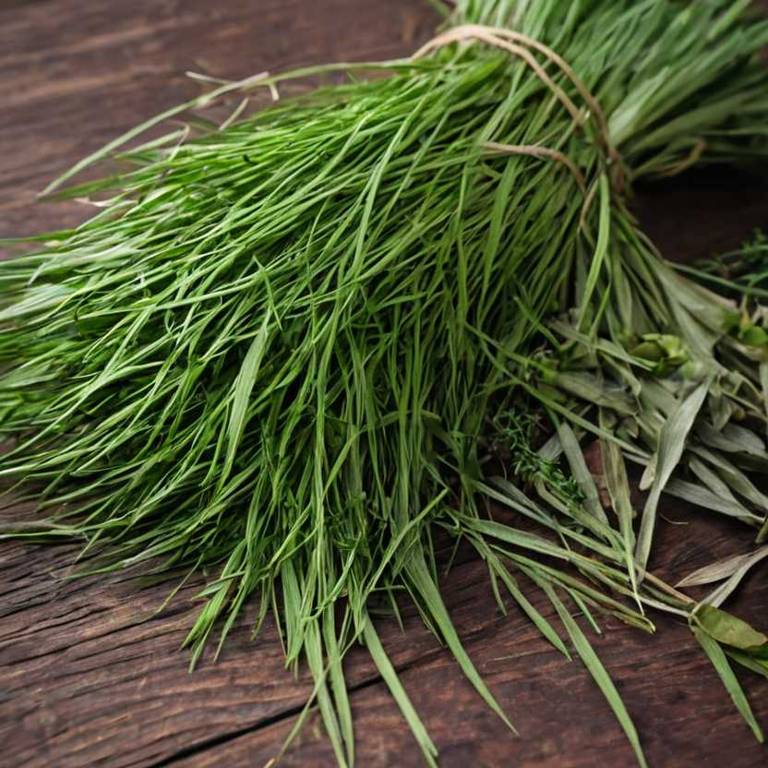By Leen Randell
Updated: Jul 20, 2024
10 Medicinal Constituents Of Cymbopogon Citratus (Lemongrass)

Cymbopogon citratus has active constituents such as citral, geraniol, and limonene.
These compounds have antimicrobial, anti-inflammatory, and antioxidant properties. The medicinal properties of lemongrass can help alleviate digestive issues, reduce fever and stress, and promote skin health. For instance, citral in lemongrass may help soothe digestive problems, while geraniol can aid in reducing anxiety and improving sleep quality.
These constituents can significantly improve people's lives by providing natural remedies for common health issues.
This article explains in details the 10 best active constituents of Cymbopogon citratus.
1. Citral
Cymbopogon citratus citral is a natural compound found in its essential oil.
Citral is a mixture of two isomers, geranial and neral, which are responsible for the citrusy scent and flavor of lemongrass. It has been traditionally used in aromatherapy to promote relaxation, reduce stress and anxiety, and uplift mood.
Additionally, citral exhibits antimicrobial properties, making it effective against various bacteria, viruses, and fungi.
2. Geraniol
Cymbopogon citratus geraniol is a naturally occurring compound found in its essential oil.
This yellowish liquid has a sweet, floral scent and is used extensively in perfumery and aromatherapy products. Geraniol is also utilized in the food industry due to its antimicrobial properties, making it an effective preservative agent.
Additionally, geraniol exhibits antifungal and insect repellent characteristics, making it a valuable ingredient in various applications.
3. Linalool
Cymbopogon citratus linalool is a natural compound found in its essential oil.
It is a sesquiterpene alcohol with a sweet and floral aroma, which is responsible for the characteristic scent of lemongrass. Linalool has been traditionally used in traditional medicine and aromatherapy due to its calming and relaxing properties, as well as its ability to reduce anxiety and stress levels.
Its presence in lemongrass oil also contributes to its antimicrobial and antifungal activities.
4. Limonene
Cymbopogon citratus limonene is a natural compound responsible for the characteristic citrusy aroma and flavor of this popular herb.
Limonene is a major constituent of lemongrass essential oil, accounting for approximately 70-80% of its composition.
It is a monoterpene, a type of organic compound known for its potent antioxidant and antimicrobial properties, which contribute to lemongrass's numerous health benefits and culinary uses.
5. Beta-pinene
Cymbopogon citratus beta-pinene is a natural essential oil compound responsible for its citrusy and refreshing scent.
Found in the leaves of the plant, it accounts for approximately 20-30% of its total volatile oils. Beta-pinene has been traditionally used in traditional medicine to alleviate digestive issues, reduce inflammation, and even combat stress and anxiety.
Its antimicrobial properties also make it an effective natural preservative in food and cosmetic products.
6. Alpha-pinene
Cymbopogon citratus alpha-pinene is a monoterpene hydrocarbon compound found in its essential oil.
It is responsible for the distinctive citrusy and uplifting aroma of lemongrass, making it a popular ingredient in perfumes, cleaning products, and aromatherapy. Alpha-pinene has been traditionally used to treat digestive issues, relieve stress, and even repel insects.
Its antimicrobial and antifungal properties also make it effective against certain infections and skin conditions.
7. Citronellal
Cymbopogon citratus citronellal is a natural compound found in the essential oil of this plant.
It is a colorless liquid with a sweet, citrusy scent and is commonly used in aromatherapy for its calming and uplifting properties.
Citronellal has been shown to possess antibacterial and anti-inflammatory properties, making it a popular ingredient in skincare products and traditional medicine.
8. Geranial
Cymbopogon citratus geranial is a natural compound extracted from its essential oil.
It is a yellowish liquid with a strong citrus scent and is commonly used in aromatherapy, perfumes, and flavorings. Geranial has various health benefits, including antibacterial, anti-inflammatory, and antioxidant properties, making it effective against infections and skin issues.
Its fresh and uplifting aroma also promotes mental clarity and reduces stress.
9. Neral
Cymbopogon citratus neral is a chemical compound extracted from the essential oil of the plant.
It is a yellowish-orange liquid with a citrusy and woody scent, commonly used in aromatherapy to promote relaxation, reduce anxiety, and improve mood.
Neral has antimicrobial properties, making it effective against certain bacteria and fungi, and is often used as a natural preservative in food and cosmetics.
10. Beta-myrcene
Cymbopogon citratus beta-myrcene is a naturally occurring sesquiterpene compound found in the essential oil of this tropical grass.
It has been studied for its potential therapeutic benefits, including antioxidant and anti-inflammatory properties, as well as its ability to exhibit antimicrobial activity against certain microorganisms.
Beta-myrcene has also shown promise in the treatment of various health conditions, such as anxiety and stress.